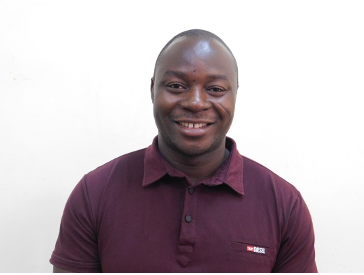
This article was written by , P. Émile Bobozi., Integrate Health’s Community-Based Health Program Director. Émile began working for Integrate Health in 2014 as a Nurse and has since held multiple community-based roles. He is motivated by Integrate Health’s mission to strengthen the health system, rather than replace it. This article was originally posted on Integrate Health’s Medium.
One year ago, my team and I were at a meeting with the Kéran district health officials prior to launch of the Integrated Primary Care Program. During the meeting, we explained our commitment to hiring women as Community Health Workers. At that moment, one of the government health officials turned to me and said, “You will not find any female candidates.” At Integrate Health, we are passionate about providing women with the opportunity to become leaders in their communities, so when we heard that, we were alert, but not disheartened.
This wasn’t the first time we’ve been told that, and although we were aware of the gender inequalities in the community, we knew the skeptics were wrong. At every meeting with the community thereafter, my team and I would walk door-to-door talking and listening to women and their families, explaining the benefits that would come from becoming a Community Health Worker in their communities. Once it came time to recruit candidates, contrary to what we had been told, we had 200 applicants; and every single one was a woman. This was because we worked hard to engage women and their families, to learn about their concerns, and to address them. We listened to women. We have heard familiar excuses over and over when we explain our approach to community involvement. Some think it is too challenging or takes too much time, but for us, it is the reason we exist.
As Integrate Health’s Program Director, I get to sit down with community leaders, mothers, grandmothers, children, and fathers to explain to them their role in building a healthcare system. I started working for Integrate Health in 2014 as a Nurse, then held many community-based roles — as a Community Health Worker Supervisor, Clinical Mentor, then Mentor Coordinator. Each role reinforced to me how essential the community’s voice is in ensuring that a healthcare system meets the needs of the people.
Integrate Health engages the community from the beginning.
We set up meetings with community leaders, traditional healers, and community members months in advance of program launch. And we don’t stop there. We continue to involve the community by holding over 700 community meetings a year, every single year. At these meetings, we present data from the program, and we hold a forum in which anyone can speak about both their positive and negative experiences with the Integrated Primary Care Program. Through these meetings, community members become central actors in determining the fate of their healthcare system.

Their participation also helps us. By creating an environment in which the community can openly voice their needs, wants, and concerns, we can work to provide solutions. Before offering a service to the community, it is important to ask them what they really need, so that we know what we are providing is actually beneficial. As the community’s health concerns evolve, we can remain flexible and adapt with them to achieve those goals.
A community leader recently called to tell me about some challenges that a Community Health Worker was facing in her community. Because this Community Health Worker wasn’t originally from the community but lived there now, people struggled to trust her. Our team ended up visiting the community and speaking with the families, explaining the extent of the Community Health Worker’s training and her passion for serving her community. After the meeting, things started to change for her, and today she is successfully delivering healthcare with the trust of her patients. We recognize that we couldn’t have done that alone. The community leader knew the importance of the Community Health Worker’s success and came to us with a problem that we could solve together.
“[Community Leaders] are the ones leading the response, and we are supporting their efforts.”
This, to me, is the most important point of involving the community — ensuring ownership. Because we involve the community and community leaders in the very first discussions about the organization’s actions in their communities, we ensure their full buy-in to overseeing their healthcare system. As a result, even if the actors of the program were to change, the community will continue to lead in how the activities are carried out. Even today, in the face of COVID-19, community leaders are pushing forward, assisting us to provide healthcare to their communities. They have worked with us to deliver essential health information through drummers and radio shows. They have asked us to continue with the launch of the Integrated Primary Care Program because despite the challenges posed by the pandemic, they realize healthcare is too critical to delay. They are the ones leading the response, and we are supporting their efforts.
Just as we spent extra time sitting with community members throughout the district of Kéran to recruit women candidates to be Community Health Workers, we will continue to prioritize listening to and engaging with the community, no matter how challenging or time-consuming. Because for us, without community, there is no effective health system.
